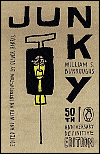Future Mythologies
A Textual Journey with Maxwell Von BismarckMonday, January 30, 2006

I've read my fair share of those colorful little Intro books. The ones that tackle a vast and indefinable philosophy in a fun, easy-to-read way. There are several lines, such as Introducing... and A Very Short Introduction to, which have many very helpful and enjoyable volumes. However, I haven't found an introduction to Buddhism as clear as this one - and it's very refreshing. Nhat Hanh writes with compassion, understanding, and considerable authority. By about 100 pages in, I was ready to convert. What he gives us is not an expansive overview of Buddhism in all its varieties, but more like a crash course in the one that he teaches. A wonderful book.
Friday, January 27, 2006

With the ridiculously stupid furor over Frey's book A Million Little Pieces spilling over the media, it seems timely that I just recently read Burroughs' Junky for the first time. I haven't read Frey, but Junk was such a great read that the question of authenticity in the work didn't enter my mind until a week after I had finished it. But if you've read any of Burroughs' corpus you probably know that the author's responsibility toward the reader to represent reality, honesty, and truth are three entirely different things.
Junk is Burroughs first book, and is half a world apart from Naked Lunch and the Nova trilogy. The sci-fi elements are almost completely absent, and the dystopian paranoia is much more subtle. It works as a great introduction, as you can see how lucid he can be when he wants to, and every once in a while he delves into the surreal workshop and begins to forge the materials of his (and our) literary future.
Thursday, January 26, 2006

Touching From a Distance is perhaps the key primary source for one of the 20th century's richest, most complex bodies of music (namely Joy Division, but perhaps Manchester post-punk in general). Also, along with Morley's Nothing, it's one of the most honest and revealing biographies of the English punk era. Nothing sits on my chairside shelf waiting to be read, so I can't compare the two yet.
Touching, in addition to adding to the psychological insight behind Joy Division's music, also, perhaps for the first time, tells the story of an astoundingly successful rock band from a wife's point of view and manages to irreversibly color the legacy (I believe Cynthia Lennon released a book, but it is lost in an ocean of Beatles-related writings). Ian Curtis does not come across as a very nice person, but it doesn't make me like him any less as he was clearly a very disturbed person living in a society that had no idea how to help him. I would recommend it whole-heartedly, but when it comes to the Manchester music scene, I'm fairly easy to please (I loved the much-hated 24 Hour Party People, for instance).

Book Reviews!
are apparently a new feature at this blog, which I can never seem to get the energy to contribute toward. First is Ajax, published by Cambridge University Press. The translation is clear and enjoyable, leaning toward the accuracy end of the poetry/accuracy spectrum. Little information is given about the translator, I suppose we are supposed to envision all of their Greek drama as one collective work.
I didn't think I would enjoy it, as the only Sophocles I had read in high school and at Emerson College was Antigone, by far the most well known of all Greek tragedy. I read the Young translation, or tried to, but was bored to sleep by what appeared to me as completely archaic and totally devoid of the catharsis its famous for.
Of course, I was just a stupid 19 year old. I now like (though not love) Antigone, and Ajax is a similar story, except operating on a more famous myth (Trojan War as opposed to Theban cycle). The play is worth it alone in that it provides Ajax's own tale, which is a little bonus between the death of Achilles and the fall of Troy. There are pportunities here to stage great scenes of insanity and torture, which is a major reason why we like tragedies so much. Productions of Ajax seem to be scarce, though.
Archives
May 2003 June 2003 July 2003 August 2003 September 2003 October 2003 November 2003 December 2003 January 2004 February 2004 March 2004 April 2004 May 2004 August 2004 October 2004 November 2004 December 2004 January 2005 February 2005 June 2005 September 2005 January 2006 February 2006 March 2006